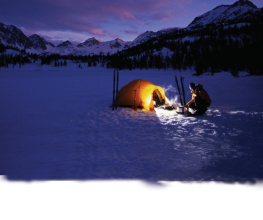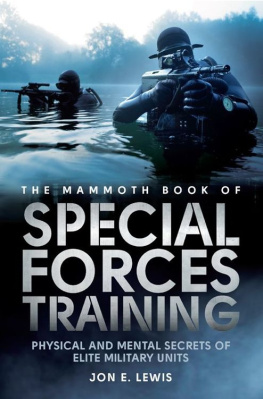
www.amberbooks.co.uk
THE SAS AND ELITE FORCES MANUAL OF
MENTAL & PHYSICAL
ENDURANCE
How to reach your physical
and mental peak
ALEXANDER STILWELL

This digital edition first published in 2013
Published by
Amber Books Ltd
7477 White Lion Street
London N1 9PF
United Kingdom
Website: www.amberbooks.co.uk
Appstore: itunes.com/apps/amberbooksltd
Facebook: www.facebook.com/amberbooks
Twitter: @amberbooks
Copyright 2013 Amber Books Ltd
ISBN: 978-1-909160-32-3
Project Editor: Michael Spilling
Design: Hawes Design
Picture Research: Terry Forshaw
Illustrations: Tony Randell Illustration
PUBLISHERS NOTE
Neither the author or the publisher accept responsibility for any loss, injury, or
damage caused as a result of the use of techniques described in this book.
Nor for any prosecutions or proceedings brought or instigated against any person
or body that may result from using these techniques.
PICTURE CREDITS
Corbis, Getty Images, Image, Popperfoto, TRH Pictures, U.S. Department of Defense
Contents
The popularity of extreme sports sport extrem in French demonstrates the fundamental human need to face challenges and overcome them, even if it is necessary for some people to build those challenges themselves.
Introduction
You are what you think is a well-known phrase but, like many familiar phrases, it deserves closer scrutiny. While the mind controls the physical body in a direct way through the will, the mind itself is divided into the conscious and the subconscious.
The subconscious stores influences that may have been picked up since childhood, and these influences can affect an individuals conscious assessment of their ability to overcome obstacles. Somebody who has had a history of being put down whenever they open their mouth, for example, may have developed an irrational fear of speaking in public. To quote Henry Ford: Think you can, think you cant, either way youll be right.
Facing Fears
In his book Call it Courage, Armstrong Sperry tells the story of a Polynesian boy called Mafatu, who was afraid of the sea. Mafatu means Stout Heart in Polynesian and his name, added to the fact that his island was surrounded by the element he most feared, presented Mafatu with a significant problem. Either he had to accept the name of Coward, which he was increasingly called behind his back, and never engage with the source of his fear, or he had to do something about it. Luckily for him, he chose to confront his fear and set out to sea in a small canoe with a couple of pets. By facing his fear and overcoming the challenge, Mafatu was able to return to his island having lived up to his name.
It should be noted that the boy was not named Coward or Weakling at birth. He was given a name that implies high expectations and a certain inherent dignity. The name, however, is also owed to the achievements of his predecessors. Mafatu comes from a long line of stout hearts. It is not, however, enough to inherit courage; he has to prove it to others, and also to himself. In other words, being born of a line of brave people does not exonerate him from having to face fear himself. Courageous people, therefore, are not people who have an absence of fear, but they are people who have learned to overcome fear. The experience of overcoming fear in certain circumstances gives them confidence when faced with a similar set of circumstances, although they may still experience the sensation of fear.
Fear of the unknown is natural, but many people populate this unknown with imaginary scenes that are unlikely ever to take place, thus increasing their irrational fear. Note Guardinis words again: living means advancing into this unknown region. In other words, if, like Mafatu, you listen to your fears and do not advance into the unknown region, you are not really living, and you are not living up to either the expectations of others or the expectations conferred upon you by your own dignity as a human being.
The Polynesian boy Mafatu faces the waves. Courage is in proportion to the fear that some challenge arouses in a particular person. Many fears are understandable; others are somewhat irrational. By overcoming the fear, however, courage and confidence are born.
Physical and Mental Endurance
Having taken courage into your hands and advanced into the unknown region, whether it be the sea or some other area of challenge, it is not much good to simply get your toes wet and skip out again. The next stage involves staying with it and seeing it through. For Mafatu, like the explorers on the Kon-Tiki expedition, he had to encounter storms, dangerous sea animals and other rigours, and endure the journey until it was complete. The journey and all of its challenges helped to build his character and help him to prove that Tough times never last, tough people do! (Robert Schuller)
Many lasting stories of courage imply endurance and tenacity as part of the deal it is not just a question of turning up and being there, you have to last the course. Usually you only last the course if your mental fitness is not only equal, but also superior to your physical fitness. Those people who surpass even this level of achievement, however, have something else: they have the spiritual or subconscious foundations to take them beyond what conscious mental reasoning or grit would deem possible. From those who belong to this hall of fame, everyone will have their favourites. There are the masters of the sea, the intrepid explorers who set out from Portugal and Spain in the fifteenth century to discover the unknown world in which they lived; there are the men and women who have circumnavigated the globe in yachts or other craft, such as Robin Knox Johnston and Emma Richards; and those who have attempted extraordinary journeys to prove a theory, such as Thor Heyerdahl and the men of the Kon-Tiki and Ra expeditions. There are the masters of the land: men and women who have set off on incredible journeys, such as Marco Polo, or who have scaled mountains with limited equipment or backup. Joining these people are the masters of the air, such as the early pioneers of air mail Saint-Exupry, for example.
Masters of the Sea
Ferdinand Magellan led the expedition that first circumnavigated the globe in 1519, his adventure roughly equivalent in those days to a modern journey to Mars. Hot-headed, belligerent and ruthless, Magellan possessed both the drive and determination to carry off such a staggering journey, but he was not a pleasant person. His pride and his thirst for glory made enemies of his own shipmates and of the natives who finally killed him. Although the expedition was successful, Magellan himself did not live to savour the victory.
Captain James Cook was to circumnavigate the globe three times, and his discoveries led to a massive increase in Britains imperial possessions, including the island continent of Australia. He was also the first man to circumnavigate Antarctica. Like Magellan, Cook lost his life in a scuffle with natives, but his personality was very different to that of the Portuguese man. Cook was taciturn and selfcontrolled, almost a grey man. He was not the type of person you would want to cross, but he did not let his emotions get the better of him. Strangely enough, a rare fit of anger over the theft of a goat led to his untimely death.
Next page
















